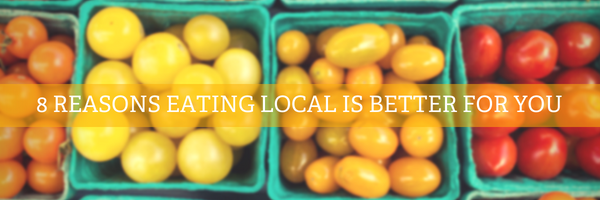Eating local typically means eating food that was grown within 100 miles of where it’s purchased. But why does it matter?
Our dietitian, Brianna, rounded up some of the top reasons you should Eat Local.
- More nutrients. Local food is packed full of nutrients due to the quality of soil the food is grown in. Commercial fruits and veggies that are grown on large-scale farms deplete the nutrients in the soil quick due to the extremely large output. Smaller, local farms grow produce on a smaller scale, which preserves the quality of nutrient makeup of the soil. Furthermore, nutrient density of our food decreases the longer it sits in transit and in warehouses while traveling across countries. Eating locally shortens this time period between harvest and consumption. DID YOU KNOW? One local, organic apple may have 4 times more nutrients than a conventional, commercial one that came from a large farm.
- More flavor. Local crops are picked at their peak of ripeness, whereas larger scale crops are picked when it is convenient and/or much too early (when nutrients are not at their peak). Fruits and vegetables at local grocers may have been picked just 24 hours ago. Try and you will taste the difference and the intensity of flavor.
- Helps alleviate allergy symptoms. Research shows that eating a spoonful of local honey daily may reduce symptoms of allergies by gradually building immunity. Exposing your body regularly to local allergens in small amounts aids your body in building up a tolerance to these irritants when exposed to them.
- Supports local economy. Spending your money on local goods ensures that money stays in your city, where it then helps in building up businesses, communities, and local services.
- Supports environment. Less travel means fewer carbon emissions. Reducing your carbon footprint in any way possible supports cleaner air and may prevent the effects of climate change. Eating local also helps to preserve green space in your community and cultivate soil.
- Safer food. The longer your food has to travel and sit in storage, the greater the chance of that food being contaminated and/or spoiled. Eating local drastically reduces these chances.
- More variety. Eating local forces you to eat seasonally, which in turn causes you to eat a greater variety of foods than you typically may. Eating a greater variety of foods supports a well-balanced diet and allows you to reach the recommended amounts of different nutrients from all of the food groups that you may normally avoid. Different foods provide different amounts and types of nutrients. Therefore, variety is key to a healthy, balanced diet.
- More knowledge. Product knowledge is much easier to come by when crops were raised nearby. Visit where your food comes from, meet the person who grew it, and get answers to your questions of just what is added, how crops are grown, and what the best ways of eating these foods are! You may be surprised by what you learn.
Need some recipes or other ideas for your CSA veggies? Book a consultation with Brianna. She is friendly and enthusiastic about helping you enjoy healthy eating. (And she has fantastic recipes.)
Evidence-based sources:
- The Academy of Nutrition and Dietetics
- National Institute of Health
- Michigan State University Extension research
- University of Washington research
- Down to Earth Organic and Natural
- Food Matters
